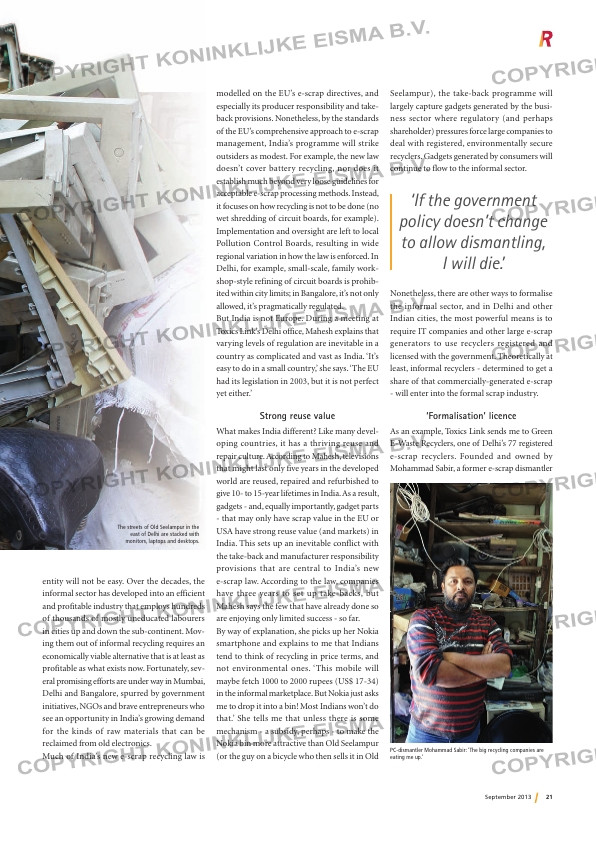Page 21 from: September 2013

21September 2013
entity will not be easy. Over the decades, the
informal sector has developed into an efficient
and profitable industry that employs hundreds
of thousands of mostly uneducated labourers
in cities up and down the sub-continent. Mov-
ing them out of informal recycling requires an
economically viable alternative that is at least as
profitable as what exists now. Fortunately, sev-
eral promising efforts are under way in Mumbai,
Delhi and Bangalore, spurred by government
initiatives, NGOs and brave entrepreneurs who
see an opportunity in India’s growing demand
for the kinds of raw materials that can be
reclaimed from old electronics.
Much of India’s new e-scrap recycling law is
modelled on the EU’s e-scrap directives, and
especially its producer responsibility and take-
back provisions. Nonetheless, by the standards
of the EU’s comprehensive approach to e-scrap
management, India’s programme will strike
outsiders as modest. For example, the new law
doesn’t cover battery recycling, nor does it
establish much beyond very loose guidelines for
acceptable e-scrap processing methods. Instead,
it focuses on how recycling is not to be done (no
wet shredding of circuit boards, for example).
Implementation and oversight are left to local
Pollution Control Boards, resulting in wide
regional variation in how the law is enforced. In
Delhi, for example, small-scale, family work-
shop-style refining of circuit boards is prohib-
ited within city limits; in Bangalore, it’s not only
allowed, it’s pragmatically regulated.
But India is not Europe. During a meeting at
Toxics Link’s Delhi office, Mahesh explains that
varying levels of regulation are inevitable in a
country as complicated and vast as India. ‘It’s
easy to do in a small country,’ she says. ‘The EU
had its legislation in 2003, but it is not perfect
yet either.’
Strong reuse value
What makes India different? Like many devel-
oping countries, it has a thriving reuse and
repair culture. According to Mahesh, televisions
that might last only five years in the developed
world are reused, repaired and refurbished to
give 10- to 15-year lifetimes in India. As a result,
gadgets – and, equally importantly, gadget parts
– that may only have scrap value in the EU or
USA have strong reuse value (and markets) in
India. This sets up an inevitable conflict with
the take-back and manufacturer responsibility
provisions that are central to India’s new
e-scrap law. According to the law, companies
have three years to set up take-backs, but
Mahesh says the few that have already done so
are enjoying only limited success – so far.
By way of explanation, she picks up her Nokia
smartphone and explains to me that Indians
tend to think of recycling in price terms, and
not environmental ones. ‘This mobile will
maybe fetch 1000 to 2000 rupees (US$ 17-34)
in the informal marketplace. But Nokia just asks
me to drop it into a bin! Most Indians won’t do
that.’ She tells me that unless there is some
mechanism – a subsidy, perhaps – to make the
Nokia bin more attractive than Old Seelampur
(or the guy on a bicycle who then sells it in Old
Seelampur), the take-back programme will
largely capture gadgets generated by the busi-
ness sector where regulatory (and perhaps
shareholder) pressures force large companies to
deal with registered, environmentally secure
recyclers. Gadgets generated by consumers will
continue to flow to the informal sector.
Nonetheless, there are other ways to formalise
the informal sector, and in Delhi and other
Indian cities, the most powerful means is to
require IT companies and other large e-scrap
generators to use recyclers registered and
licensed with the government. Theoretically at
least, informal recyclers – determined to get a
share of that commercially-generated e-scrap
– will enter into the formal scrap industry.
‘Formalisation’ licence
As an example, Toxics Link sends me to Green
E-Waste Recyclers, one of Delhi’s 77 registered
e-scrap recyclers. Founded and owned by
Mohammad Sabir, a former e-scrap dismantler
‘If the government
policy doesn’t change
to allow dismantling,
I will die.’
PC-dismantler Mohammad Sabir: ‘The big recycling companies are
eating me up.’
The streets of Old Seelampur in the
east of Delhi are stacked with
monitors, laptops and desktops.
p20_E-scrap in India.indd 21 03-09-13 09:38



